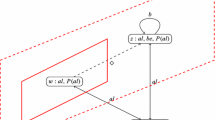Abstract
The knowability paradox is an instance of a remarkable reasoning pattern (actually, a pair of such patterns), in the course of which an occurrence of the possibility operator, the diamond, disappears. In the present paper, it is pointed out how the unwanted disappearance of the diamond may be escaped. The emphasis is not laid on a discussion of the contentious premise of the knowability paradox, namely that all truths are possibly known, but on how from this assumption the conclusion is derived that all truths are, in fact, known. Nevertheless, the solution offered is in the spirit of the constructivist attitude usually maintained by defenders of the anti-realist premise. In order to avoid the paradoxical reasoning, a paraconsistent constructive relevant modal epistemic logic with strong negation is defined semantically. The system is axiomatized and shown to be complete.
Similar content being viewed by others
REFERENCES
Akama, S.: Curry's paradox in contractionless constructive logic, J. Philos. Logic 25 (1996), 135-150.
Almukdad, A. and Nelson, D.: Constructible falsity and inexact predicates, J. Symbolic Logic 49 (1984), 231-233.
Božíc, M. and Došen, K.: Models for normal modal intuitionistic logics, Studia Logica 43 (1984), 15-43.
Chellas, B.: Modal Logic. An Introduction, Cambridge University Press, Cambridge, 1980.
Dummett, M.: Victor's error, Analysis 61 (2001), 1-2.
Dunn, J. M.: Relevance logic and entailment, in F. Guenthner and D. Gabbay (eds.), Handbook of Philosophical Logic, Vol. 3, Reidel, Dordrecht, 1986, pp. 117-224.
Dunn, J. M.: Partiality and its dual, Studia Logica 66 (2000), 5-40.
Edgington, D.: The paradox of knowability, Mind 94 (1985), 557-568.
Fitch, F.: Symbolic Logic. An Introduction, Ronald Press, New York, 1952.
Fitch, F.: The system C△ of combinatory logic, J. Symbolic Logic 28 (1963), 87-97.
Fitch, F.: A logical analysis of some value concepts, J. Symbolic Logic 28 (1963), 135-142.
Fuhrmann, A.: Relevant logics, modal logics and theory change, Ph.D. thesis, Department of Philosophy, Australian National University, Canberra, 1988.
Fuhrmann, A.: Models for relevant modal logics, Studia Logica 49 (1990), 501-514.
Gettier, E.: Is justified true belief knowledge? Analysis 23 (1963), 121-123.
Gurevich, Y.: Intuitionistic logic with strong negation, Studia Logica 36 (1977), 49-59.
Hart,W.: The epistemology of abstract objects: Access and inference, Proc. Aristotelean Soc. 53 (1979), 152-165.
Johansson, I.: Der Minimalkalkül, ein reduzierter intuitionistischer Formalismus, Composito Mathematicae 4 (1936), 119-136.
Kracht, M.: On extensions of intermediate logics by strong negation, J. Philos. Logic 27 (1998), 49-73.
von Kutschera, F.: Ein verallgemeinerter Widerlegungsbegriff für Gentzenkalküle, Arch. für Math. Logik Grundlag. 12 (1969), 104-118.
Lindström, S.: Situations, truth and knowability: A situation-theoretic analysis of a paradox by Fitch, in E. Ejerhed and S. Lindström (eds.), Logic, Action, and Cognition – Essays in Philosophical Logic, Kluwer Academic Publishers, Dordrecht, 1997, pp. 181-209.
López-Escobar, E.: Refutability and elementary number theory, Indag. Math. 34 (1972), 362-374.
Mackie, J.: Truth and knowability, Analysis 40 (1980), 90-92.
Melia, J.: Anti-realism untouched, Mind 100 (1991), 341-342.
Nelson, D.: Constructible falsity, J. Symbolic Logic 14 (1949), 16-26.
Nelson, D.: Negation and separation of concepts in constructive systems, in A. Heyting (ed.), Constructivity in Mathematics, North-Holland, Amsterdam, 1959, pp. 208-225.
Pearce, D.: n Reasons for choosing N, Technical Report 14/91, Gruppe für Logik, Wissenstheorie und Information, Free University of Berlin, 1991.
Percival, P.: Fitch and intuitionistic knowability, Analysis 50 (1990), 182-187.
Rabinowicz, W.: Intuitionistic truth, J. Philos. Logic 14 (1985), 191-228.
Rabinowicz, W. and Segerberg, K.: Actual truth, possible knowledge, Topoi 13 (1994), 101-115.
Rasiowa, H.: An Algebraic Approach to Non-classical Logic, North-Holland, Amsterdam, 1974.
Rautenberg, W.: Klassische und nichtklassische Aussagenlogik, Vieweg Verlag, Braunschweig, 1979.
Routley, R.: Semantical analyses of propositional systems of Fitch and Nelson, Studia Logica 33 (1974), 283-298.
Routley, R. and Meyer, R. K.: The semantics of entailment II, J. Philos. Logic 1 (1972), 53-73.
Routley, R. and Meyer, R. K.: The semantics of entailment III, J. Philos. Logic 1 (1972), 192-208.
Routley, R. and Meyer, R. K.: The semantics of entailment, in H. Leblanc (ed.), Truth, Syntax and Modality, North-Holland, Amsterdam, 1973, pp. 194-243.
Rückert, H.: A solution to Fitch's paradox of knowability, in D. Gabbay, S. Rahman, J. Torres and J. P. van Bendegem (eds.), Logic, Epistemology and the Unity of Science, Kluwer Academic Publishers, Dordrecht, 2002, to appear.
Shramko, Y., Dunn, M., and Takenaka, T.: The tri-lattice of constructive truth values, J. Logic Comput. 11 (2001), 761-788.
Tennant, N.: The Taming of the True, Clarendon Press, Oxford, 1997.
Tennant, N.: Victor Vanquished, Analysis, to appear.
Thomason, R.: A semantical study of constructible falsity, Z. Math. Logik Grundlag. Math. 15 (1969), 247-257.
Wagner, G.: Logic programming with strong negation and unexact predicates, J. Logic Comput. 1 (1991), 835-859.
Wansing, H.: The Logic of Information Structures, Lecture Notes in AI 681, Springer-Verlag, Berlin, 1993.
Wansing, H.: Tarskian structured consequence relations and functional completeness, Math. Logic Quart. 41 (1995), 73-92.
Wansing, H.: Semantics-based nonmonotonic inference, Notre Dame J. Formal Logic 36 (1995), 44-54.
Wansing, H.: Negation as falsity: A reply to Tennant, in D. Gabbay and H. Wansing (eds.), What is Negation?, Kluwer Academic Publishers, Dordrecht, 1999, pp. 223-238.
Wansing, H.: Negation, in L. Goble (ed.), The Blackwell Guide to Philosophical Logic, Basil Blackwell, Cambridge, MA, 2001, pp. 415-436.
Williamson, T.: Intuitionism disproved? Analysis 42 (1982), 203-207.
Williamson, T.: On the paradox of knowability, Mind 96 (1987), 256-261.
Williamson, T.: Knowability and constructivism, Philos. Quart. 38 (1988), 422-432.
Williamson, T.: On intuitionistic modal epistemic logic, J. Philos. Logic 21 (1992), 63-89.
Williamson, T.: Never say never, Topoi 13 (1994), 135-145.
Williamson, T.: Tennant on knowable truth, Ratio 31 (2000), 99-114.
Author information
Authors and Affiliations
Rights and permissions
About this article
Cite this article
Wansing, H. Diamonds are a Philosopher's Best Friends. Journal of Philosophical Logic 31, 591–612 (2002). https://doi.org/10.1023/A:1021256513220
Issue Date:
DOI: https://doi.org/10.1023/A:1021256513220



